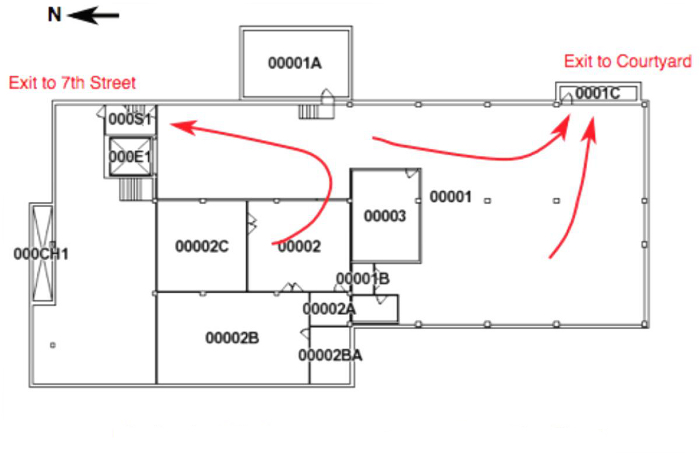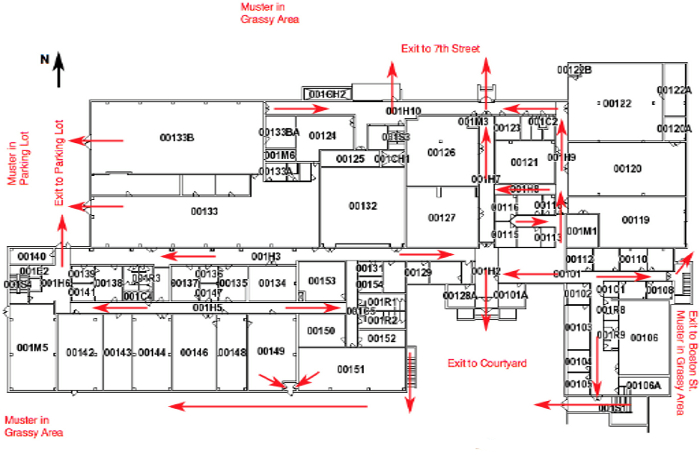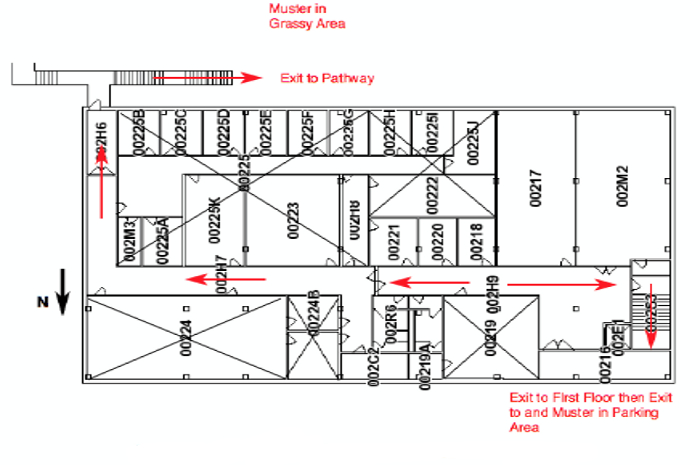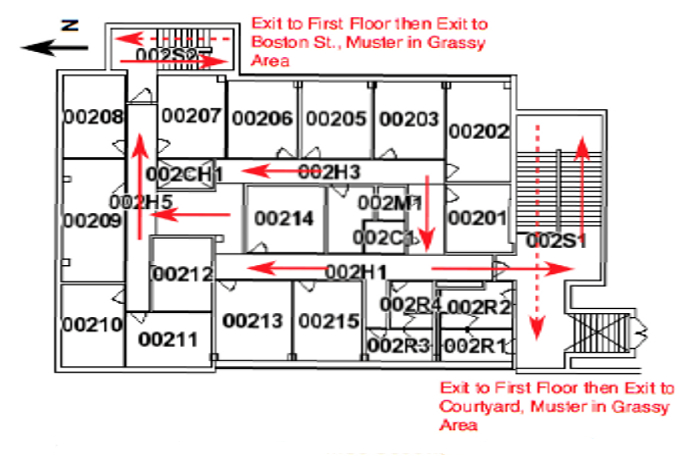Mechanical Engineering Safety Plan
The purpose of this safety plan is to outline the policy and procedure for providing a safe environment for students, staff, faculty, and visitors to engage in productive endeavors associated to the Department of Mechanical Engineering. This plan will be reviewed and/or revised during the fall of even years wholly divisible by four. The policies presented herein are derived from the policies provided under Texas Tech University Operating Procedures 10.x, 60.x, 76.x. The university policies provided in the OP supersede where conflicts may arise between the policies provided herein and those described in the OP.
The Department of Mechanical Engineering will submit to safety audits conducted by the TTU EH&S Staff during September of every even year, and provide corrective actions as needed before the end of January the following year.
This safety plan is divided into sections as follows:
- General Safety
- Fire Safety
- Severe Weather Event Safety
- Emergency Action Under Threats of Violence
- Classroom Safety
- Laboratory Safety
- Hazardous Material Handling and Emergency Action
Action Items
- Plan and review/revision even years wholly divisible by four.
- EH&S walkthrough every September in even years.
- Corrective action taken by January following EH&S visit.
General Safety
The applicable university operating procedure is TTU OP 60.01.
The goal of this TTU ME Safety Policy is to promote safe endeavors in the department through a safety policy implementation that pervades the fabric of operations in the department. The policy implementation hierarchy is as follows:
- Department Chairperson
- Department Safety Committee
- Faculty and Staff
- TA/RA
- Students
- Visitors
Individuals are responsible for their own actions regarding safety and each level of the hierarchy is responsible for those levels that numerically follow in the list. Individuals that witness unsafe practices at any level are encouraged to courteously address the unsafe practices of a group or individual at the time of the action. Each individual in a given level of the hierarchy is encouraged to seek the assistance of persons in the next higher level of the hierarchy to assist in addressing unsafe practices witnessed in any level of the hierarchy. If corrective action is not taken then the issue can be brought to the attention of the Chairperson for appropriate redress. If any individual believes they are in harms way in any situation that is presented in the department, those individuals are encouraged to remove themselves from the situation and seek redress as outlined above.
Safety procedures will be provided to the constituents of the department in a brochure and/or a website link and or via a seminar or class lecture to each new constituent during the first week of their tenure in the department (excepting visitors, the host of a visitor will provide needed safety measures during a given visit duration). The information to be provided will list the policies described herein. Specific policies will be reiterated as needed in the classrooms and laboratories on a semester basis, when the semester commences.
Action Items
- Create/update safety brochure/pamphlet/webpage.
- Provide safety training/education as appropriate for department constituents.
Fire Safety
The applicable university operating procedure is TTU OP 60.12.
If there is a fire:
- If you discover or suspect a fire, sound the building alarm.
- If there is no alarm in the building, notify other occupants by knocking on doors and shouting "fire" as you leave the building.
- Leave the building.
- Try to rescue others ONLY if you can do so safely.
- Move away from the building at least 50 feet, out of the way of the fire department.
- Don't go back into the building until the fire department says it is safe to do so.
- Call the Fire/Police Department:
- Dial 9−911 from campus phones.
- Dial 911 from cell phones or off−campus phones.
The exit routes to be used during a fire are indicated in the following floor plans. The figures indicate the general outdoor muster locations as well.
Action Items
- Post fire−exit routes and indicated muster areas.
Mechanical Engineering − Basement Shop Fire Exits

Mechanical Engineering − First Floor Fire Exits

Mechanical Engineering − Second Floor Fire Exits

Mechanical Engineering Office − Second Floor Fire Exits

Severe Weather Event Safety
The applicable university operating procedure is TTU OP 10.03 and OP 76.12.
Texas Tech maintains several warning and alert systems for use in the event major storms or other disasters threaten our community. Ideally, sufficient warning time will allow precautionary measures to be implemented. The unpredictable nature of weather conditions, however, does not always provide for adequate warning.
If a tornado warning is issued or a tornado is sighted, the following actions should be taken:
- Seek inside shelter, preferably a basement, or inside a steel−framed or reinforced concrete structure (including all major university buildings).
- Evacuate upper floors of all buildings.
- Seek shelter in an interior hallway and stay away from exterior glass.
- Lie flat on the floor and use tables, mattresses, or blankets for cover.
- If caught in open country, lie face down in the deepest depression available such as a ditch, culvert, or ravine.
In instances where severe weather events result in suspension of campus activities, essential personnel (defined in OP 10.03) will remain on duty while all other personnel will not report to campus. The status of the suspension of operations will be broadcast via local television and radio stations as well as via the university website. All personnel are required to remain abreast of the operation status of the campus and must report for duty when normal operations are resumed.
Action Items:
- Post shelter locations in the building.
Emergency Action Under Threats of Violence
The applicable university operating procedure is TTU OP 76.01, 76.06, and 76.10.
Texas Tech recognizes the high cost of violent incidents and the disruptive effect they have on personnel and productivity. Personal harassment (including stalking), abusive behavior, and violence are not tolerated in the workplace.
Threat of Personal Harm or Harm to a Group
All personnel, regardless of position, are responsible for the immediate reporting of any threats received, witnessed, or communicated to them. Personnel should also report unusual or threatening behavior, even though it may not be in the form of a direct threat, when such behavior makes the personnel fearful for their continued safety or the safety of others. Re−portable threats include those made by co−workers, students, or outsiders entering the workplace − such as spouse, job applicants, etc. Employees must make such re-ports regardless of the relationship of the employee to the person who initiated the threat or behavior. Reports should be made immediately, without fear of retaliation, to a supervisor, personnel management, Texas Tech Police, or to any member of Texas Tech management. Texas Tech management must immediately report all incidents of threatening behavior to the chief of police or designee or the managing director of Personnel or designee.
Bomb Threat
Upon receipt of a bomb threat, the person receiving the call should immediately notify the Texas Tech Police Department and then the departmental supervisor. A checklist is available in OP 76.06A to assist in obtaining helpful information. The Texas Tech Police Department communications operator will immediately dispatch officers to the location of the reported threat to perform a cursory search of the premises and assume responsibility for handling the threat. The police department will provide further action as required.
Action Items:
- The checklist in OP 76.06A is to be disseminated to all personnel.
Classroom Safety
The applicable university operating procedure is TTU OP 60.01.
The department will provide appropriate seating arrangements, ventilation, lighting and other environmental concerns in order to ensure a safe learning environment. It is the responsibility of the instructor to correct minor issues in the classrooms such as tripping hazards, broken furniture, etc. Major safety issues are to be brought to the attention of the department chair for further action.
Students should observe safe practices while in class. Horseplay is disallowed as well as physical and verbal abuse of peers and staff. If students find conditions in any classroom situation unsatisfactory from a safety perspective, they are encouraged to bring the issue to the attention of the instructor for further action. If the safety concerns of the student were not satisfactorily addressed by the instructor, the student may seek further redress as indicated in the general safety section of this document.
Laboratory Safety
The applicable university operating procedure is TTU OP 60.x.
Each lab will have a material safety data sheet present for inspection by all persons entering the lab. This sheet must be updated as the inventory of material changes in the lab.
The following policies apply to all students (graduate and undergraduate), faculty, and staff working in the departmental shops, labs, research facilities and touring field locations. Violation of these polices will result in suspension of lab and research privileges. In the following items, the noun 'lab' will refer to all facilities indicated above:
- Students are responsible for their own insurance coverage; consequently, students injured in the lab are responsible for their own medical bills.
- All personnel must complete documented safety training under the direction of the person of record in the lab before they will be allowed to use the equipment in the lab. For new constituents in the department, this safety training will be conducted periodically and no less than once a semester that the lab is in use. Personnel missing the safety training will be disallowed use of the lab.
- Hazards present in each lab will be posted on the exterior side of the entry doors.
- Material Safety Data Sheets will be posted near each door on the interior of each lab.
- Personnel must review the Material Safety Data Sheets before using any chemicals/hazardous materials in a lab.
- Many of the experiments are hazardous if not handled properly. The lab instructor will provide details about safe operating procedures.
- Personnel must operate all lab equipment in a safe manner. Use of safety goggles when drilling, cutting, handling caustic materials or concentrated acids, or working with pressurized vessels. In general safety goggles should be worn at all time while in the labs.
- Whenever dangerous situation are observed; a chemical spill, broken glass, someone who is not following safe procedures, the person making the observation is to report the hazard to the instructor.
- Personnel will wear appropriate clothing (this may include long sleeved shirts, long pants, steel toed shoes, safety goggles, gloves) that is not loose or bulky that might become entangled in moving equipment. Jewelry/watches is to be removed in all instances. Any long hair must be secured in such a manner that it will not become entangled with moving equipment.
- Fire Extinguishers are marked. In case of fire call 9−911.
- As appropriate, instructional labs are equipped with eye−wash and shower stations. Wash off immediately, with water, any chemical that makes skin contact.
In general, all persons using the labs will be very safety conscious, and exercise common sense such as:
- Not leaving equipment lying on the floor that could cause tripping.
- Cleaning up oil or other fluids that could cause slippage.
- Not distracting other people while they are operating equipment.
Action Items:
- Create/update safety training as needed.
- Post/update hazards sheets on all labs.
- Post/update Material Safety Data Sheets in all labs.
- Distribute safety equipment, such as goggles, as needed.
Hazardous Material Handling and Emergency Action
The applicable university operating procedure is TTU OP 60.x.
There are many situations in the normal operation of the Department of Mechanical Engineering where hazardous materials must be handled. These materials include, biological materials, chemicals, hot materials, sharp objects, etc. Extreme caution must be implemented in the handling of these materials. The TTU OP 60.x has procedures for the various scenarios that arise; ME department personnel engaged in the supervision of these kinds of activities must practice the policies presented therein.
Action Items:
- Distribute OP 60.x as needed.
Department of Mechanical Engineering
-
Address
Texas Tech University, Box 41021 | Lubbock, TX 79409 -
Phone
806.742.3563 -
Email
webmaster.coe@ttu.edu
